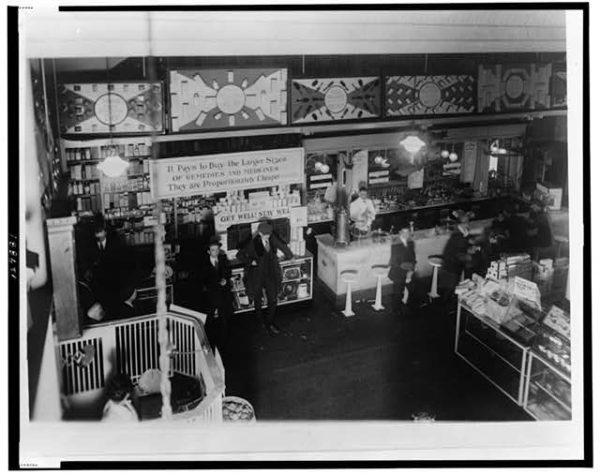The long marbled bar of the Soda Fountain still stands sturdy beneath the elbows of the cool kids even if there aren’t quite as many around now as there used to be. It may still even be possible to order an egg cream, but I’m betting that none of my friends have ever tried one. In 1920s and 30s New York they were all the rage. People still debate over who invented the egg cream, but back in the day the real news was who controlled it.

An egg cream was a cheap alternative to the ice cream most folks couldn’t afford during the the Great Depression. It has three main ingredients: milk, chocolate syrup, and seltzer or effervescent soda. No eggs and no cream, in case you didn’t know. A man who could control one of those ingredients, like the syrup for instance, could make a fortune off the backs of the soda fountain owners. Harry Solomon Dolowich decided he was going to be that man.
Dolowich had grown up as the son of Russian Jewish immigrants in the Lower East Side. His family’s initial poverty and hard times eventually turned around as both Harry and his brother obtained their law degrees and established their careers. Harry Dolowich was known for his silver tongue; he was mentioned in his year book as someone who could talk anyone into anything. He was also evidently good at making and keeping connections. One of the most important was obtained by marrying the niece of a large chocolate syrup manufacturer. Dolowich managed to talk his uncle into getting in on the ground level of an association that would divide up customers to control and improve profits while simultaneously cutting out competition. With connections in the Health Department and other big syrup companies signing on, Dolowich was setting himself up as the most powerful man in chocolate syrup.
At the time more than fifty industries in New York had been taken over by racketeers, including artichokes, fish, laundry, funeral parlors, movie theaters, grapes, and tailors. The idea was to organize control over an industry by creating an alliance of enough business owners to pressure other smaller outfits into falling in line. A business could either be a member or not have a business. Hard time befell the the businessman who tried to find a third option. Members would agree to inflated and fixed costs for their product, creating a no competition environment.
Dolowich followed this model, charging membership fees and truck fees, making sure non-compliant businesses received hefty fines and closure notices from the Department of Health, and sending out ‘dead wagons.’ Dolowich’s dead wagons were the final method of persuasion for errant chocolate syrup makers and distributors. Trucks loaded up with the same syrup at a fraction of the cost would flood the territory of the struggling business and steal all the custom.
Of course, Dolowich’s empire eventually crumbled under a lengthy and dramatic investigation. Dolowich served a short prison sentence and then moved states. So, the next time you grab that chocolate syrup for your milk or to drizzle over your ice cream, you can enjoy it knowing that it is no longer being used to crush small business owners.
Referenced
- Coe, Andrew (2003) CITY LORE; No Egg, No Cream, No Ethics. New York Times. https://www.nytimes.com/2003/08/24/nyregion/city-lore-no-egg-no-cream-no-ethics.html
- Sixty Rackets Survive Despite Gotham Evidence (1932) Evening star. [volume] (Washington, D.C.), 21 Aug. 1932. Chronicling America: Historic American Newspapers. Lib. of Congress. https://chroniclingamerica.loc.gov/lccn/sn83045462/1932-08-21/ed-1/seq-21/
- Wills, Matthew (2016) The Egg Cream Mob: What’s in an egg cream? No eggs. No cream. And a dose of mafia history. JSTOR Daily. https://daily.jstor.org/egg-cream-mob/
